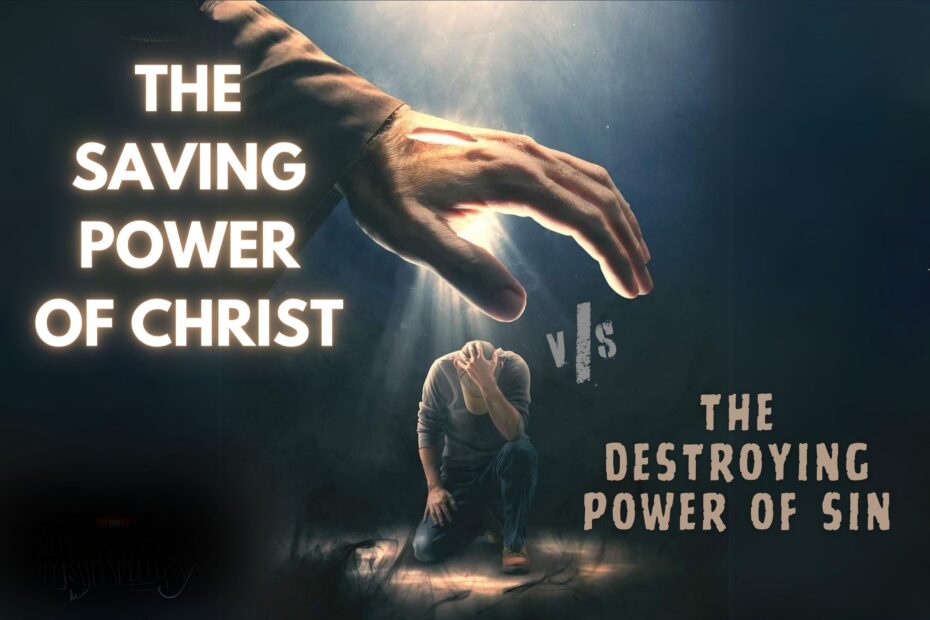Since the fall of Adam, mankind has been ruled by the power of sin. This power is at work in every living person on earth and it rules the minds and hearts of everyone. It is what makes our thoughts, words, and deeds sinful in the eyes of God. Whether a person commits something as horrific as murder or rape or adultery or whether he only cheats tells lies or lusts after someone who is not his wife, it is the same power of sin that is at work in him.

Another deadly attribute of this power at work in us is that it makes us feel that we can continue living a sinful life without giving it much thought. This was the condition even in the early church. Some felt that as long as they did not commit big sins and instead did some noble deeds, they were free of all sin. But then, such wrong notions were corrected by the Holy Spirit speaking through the leaders of the Church at that time. St. James wrote in his letter… Whoever breaks one commandment is guilty of breaking them all. (James 2:10). St. John also wrote about it… If we say that we have not sinned, we make a liar out of God, and His word is not in us. (1 John 1:10). St. Paul made a plain and simple statement… Everyone has sinned… (Romans 3:23). In fact, in today’s fast-advancing world, wrong notions about the power of sin have reached a different level. Now, even sins like euthanasia, homosexuality, abortion, live-in relationships, etc. are considered to be no sin at all. Pope Pius XII once said, “Perhaps the greatest sin in the world today is that men have begun to lose the sense of sin.” It is such loss of sense of sin that ultimately brings about one’s spiritual death. Because the Word of God says, “The wages of sin is death.” (Romans 6:23).

Therefore, to avoid impending spiritual death, one must always be conscious of the destroying power of sin in him. This is possible only through the Word of God. The more we read God’s Word, the more we realize the presence of this destroying power at work in us. Our conscience gets sharpened by the Word to the point where even small sins such as telling lies, using hurtful words, desiring material things of this world, etc. become a matter of great concern. Again, let us look closely at what John said, “If we say that we have not sinned, we make a liar out of God, and His word is not in us.” (1 John 1:10). Note how the sentence ends… His word is not in us. Therefore, it is clear that when we do not listen and meditate on the Word of God, we lose all sense of sin. Spiritual death awaits us.
On the other hand, there is hope for a person, who does have the Word of God in him – because it makes him conscious of the destroying power of sin in him. St. Paul writes about his own experience. He says, “I do not understand what I do; for I don't do what I would like to do, but instead I do what I hate. I am not really the one who does this thing; rather it is the sin that lives in me. (Romans 7:15, 17). Paul as we know was very spiritual and was even given visions and revelations by the Lord. And yet here in this letter, he openly writes about the presence of this destroying power in him. The consciousness of sin came to him so strongly because he was a man who was deeply rooted in the Word. In fact, just 3 verses below, he mentions it again... If I do what I don't want to do, this means that I am no longer the one who does it; instead, it is the sin that lives in me.” (Romans 7:20). Any line repeated in the Bible only means that God wants us to remember it well. From what we have just read, it is clear that however spiritual we may be, we cannot deny the fact that sin lives in us.

In the initial stages of becoming conscious of the destroying power of sin, we begin struggling against it using our human wisdom and strength – only to realize how helpless we are. St. Paul realized that… Wretched man that I am! Who will rescue me from this body of death? (Romans 7:24). The first part of this sentence speaks about becoming conscious of the destroying power of sin in us; whereas the second part points to our helplessness against it. It is only when we become aware of these two that we reach the point of declaring as St. Paul did… Thanks be to God, who does this through our Lord Jesus Christ! (Romans 7:25). Therefore, it is the consciousness of the destroying power of sin in us and our helplessness against it that will ultimately lead us to turn to the only one who can save us. At this stage, we have not only discovered that sin has the power to destroy us, but we also start believing that Jesus has the power to save us. Till then, Christ for us is only an illusion.
A person who believes in the saving power of Jesus feels the need for constant cleansing of his soul from all his sins and also the grace to overcome them. Both these are available to us in the Sacrament of Confession. St. John writes, “If we confess our sins to God, He will keep His promise and do what is right: He will forgive us our sins and purify us from all our wrongdoing.” (1 John 1:9). So, when we start frequenting the confessional, the power of sin starts weakening in us. For the Word says, “Everyone who lives in union with Christ does not continue to sin...” (1 John 3:6). Further, we start believing more and more in the saving power of Christ. As it is written… We know that no children of God keep on sinning, for the Son of God keeps them safe. (1 John 5:18).

We are told about the story of the sinful woman who came to Jesus at the house of Simon the Pharisee. (Luke 7:36-50). At one time, she lived a very sinful life. She had lost all sense of sin. She was openly living a sinful life because we are told that the whole town knew about it. But when she heard the teachings of Jesus, she became conscious of the power of sin in her. Definitely, she tried to fight it back several times only to return back to her sinful life. She was tired of fighting it. But now there was hope. She had heard that Jesus had the authority to forgive sins. And so, she goes to Him. There in the presence of those who knew her as a sinful woman, she starts crying and wetting the feet of Jesus with her tears. Her silence by itself became a confession. And Jesus said to her those very words, which every sinner, who is struggling with the destructive power of sin, longs to hear, "Your sins are forgiven. Your faith has saved you; go in peace." (Luke 7:48, 50).

“All our sins are forgiven and we are saved because of Christ.” This is what you and I will confess on the day when we are set free from the destroying power of sin and are brought into the presence of Our Heavenly Father by the saving power of Christ. (Romans 6:7).

